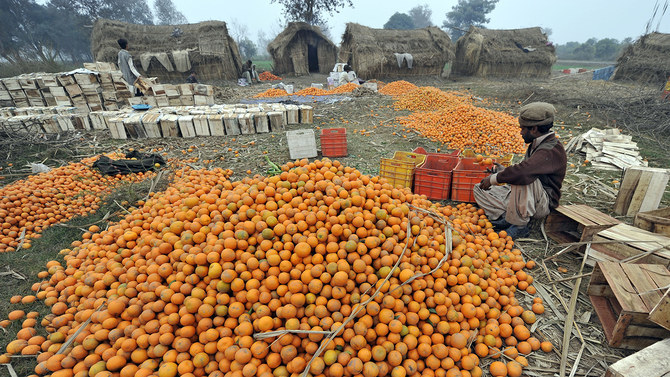ISLAMABAD: The export of kinnow is likely to be limited to 300,000 tonnes with an anticipated decrease of 35 per cent compared to the previous year due to the significant increase in sea freight cost, ill-effects of climatic changes, and reduction in the production of kinnow.
Due to this crisis, the export of kinnow to the markets of Russia, Canada, Ukraine, Indonesia, and Philippines is likely to decrease significantly this year since Pakistan exports 50pc of its total export volume of kinnow to these countries.
According to a statement by All Pakistan Fruit and Vegetable Exporters, Importers and Merchants Association (PFVA) on Tuesday, kinnow exporters are in a state of uncertainty during the current season as large-scale preparation for the fruit’s export has not yet started even though the season is due to commence from December 1.
Last year, the export of kinnow was 450,000 tonnes against the target of 350,000 tonnes, when the cost of sea freight to Russia, an important international market was $2500-3000 per container which has now been enhanced to $7000 per container.
Similarly, the sea freight cost to the Philippines, Indonesia which was $2000 has now increased to $4000-5000.
Simultaneously, with an exorbitant increase in the cost of sea freight, the shipping companies do not have any definite schedule while the cost of packing material has also increased by 40pc.
Due to the perishable nature of fruits coupled with a short shelf-life, there is no guarantee that the fruit consignments would reach their destinations in time.
Therefore, at present, there only a handful of factories in Sargodha that are preparing for the export. The development comes in as as the country’s trade deficit is ever increasing.
Commenting on the situation, PFVA Patron-in-Chief Waheed Ahmed lamented that although land routes were a better alternative to export Pakistani kinnow via Iran and Central Asian states, the cost of transportation via land routes is the same as the cost of sea freight despite the TIR convention, under which Pakistan is availing the privilege to transport trade goods via land routes.
He claimed Pakistani kinnow used to be sold in the Russian market due to being cheap compared to the same from Morocco and Turkey. The cost of a 10kg carton used to be $5-6 cheaper than the cost a kilogramme of the same fruit from the two foreign countries.
However, now due to a sharp increase in the cost of sea freight, the price would almost be equivalent to prices of the fruit from other countries, making it very difficult to remain competitive.
On other hand, the Turkish kinnow can be sent to the Russian market via land and sea routes as well which has further enhanced challenges for the Pakistani kinnow in the Russian market.
“Though Iran is a promising international market for our kinnow, this important market has been closed for the last 10 years due to non-issuance of import permit by Iranian officials. Last year, Iran had issued import permits for a limited period but this year nothing has been done at all,” Ahmed informed.
He stressed the need to negotiate with Iran to get the Iranian market to issue import permits for the export of 80,000 tonnes of Pakistani kinnow for neutralising the damage of other international markets.
“On the other hand, old orchards of kinnow are unable to resist the effects of climate change. Pakistan usually produces 2,400,000 tonnes of kinnow; however, during the current season, the production is likely to be restricted to 1,700,000 tonnes, 30pc less than the previous year,” he added, suggesting that the government of Punjab must focus on developing new varieties of Citrus.
























